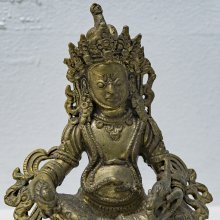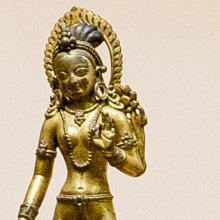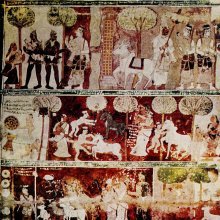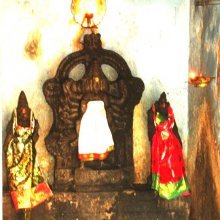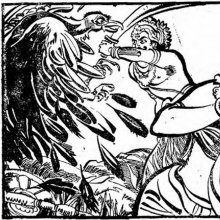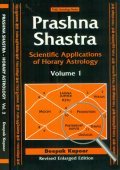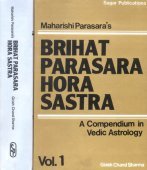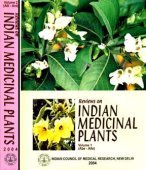Wealth: 1 definition
Introduction:
Wealth means something in Jainism, Prakrit. If you want to know the exact meaning, history, etymology or English translation of this term then check out the descriptions on this page. Add your comment or reference to a book if you want to contribute to this summary article.
Images (photo gallery)
(+11 more images available)
In Jainism
General definition (in Jainism)
Source: The University of Sydney: A study of the Twelve ReflectionsWealth is easy to find (as opposed to Wisdom), as discussed in Bhūdhardās’s composition dealing with the twelve reflections (bhāvanā or anuprekṣā), also found in the Tattvārtha-sūtra.—Accordingly, “[...] [eliminating karma]—Follow the five great vows as well as the five mindfulnesses. Conquer the five powerful sense-organs and establish yourself firmly in elimination. (10) [the world]—The Cosmic Man stands fourteen rājus tall. Within him countless souls wander without knowledge. (11) [wisdom is difficult to obtain]—Wealth, prosperity, gold, the pleasures of power—all these are easy to find. What is difficult to get in saṃsāra is the single knowledge that is appropriate. (12) [...]”.

Jainism is an Indian religion of Dharma whose doctrine revolves around harmlessness (ahimsa) towards every living being. The two major branches (Digambara and Svetambara) of Jainism stimulate self-control (or, shramana, ‘self-reliance’) and spiritual development through a path of peace for the soul to progess to the ultimate goal.
See also (Relevant definitions)
Full-text (+2877): Dhana, Artha, Vitta, Draviṇa, Kubera, Dhanamada, Svapateya, Vasu, Dhanasa, Riddhi, Lakshmi, Paradhana, Rayi, Dhanya, Sampad, Vasundhara, Alpadhana, Dhanagama, Vibhava, Rai.
Relevant text
Search found 409 books and stories containing Wealth; (plurals include: Wealths). You can also click to the full overview containing English textual excerpts. Below are direct links for the most relevant articles:
Rig Veda (translation and commentary) (by H. H. Wilson)
Amarakoshodghatana of Kshirasvamin (study) (by A. Yamuna Devi)
Buddhism and Buddhist philosophy < [Chapter 4 - Cultural Aspects]
The Concept of Heaven < [Chapter 4 - Cultural Aspects]
Fauna (5): Domesticated animals (c): Large bull < [Chapter 5 - Aspects of Nature]
Laghu-yoga-vasistha (by K. Narayanasvami Aiyar)
Part 4 - The Story of Aindhava the son of Indhu or the Moon < [Chapter III - Utpatti-prakaraṇa]
Part 8 - The Story of Bhagīratha < [Chapter VI - Nirvāṇa-prakaraṇa]
Part 3 - The Story of the Great Bali < [Chapter V - Upaṣānti-prakaraṇa]
Kautilya Arthashastra (by R. Shamasastry)
Chapter 7 - Doubts about Wealth and Harm < [Book 9 - The Work of an Invader]
Chapter 4 - Consideration about Loss of Men, Wealth, and Profit < [Book 9 - The Work of an Invader]
Chapter 3 - The Aggregate of the Troubles of Men < [Book 8 - Concerning Vices and Calamities]
Mahabharata (English) (by Kisari Mohan Ganguli)
Section XX < [Rajadharmanusasana Parva]
Section XXVI < [Rajadharmanusasana Parva]
Section VIII < [Rajadharmanusasana Parva]
Manusmriti with the Commentary of Medhatithi (by Ganganatha Jha)
Verse 4.226 < [Section XIV - Other Duties]
Verse 7.213 < [Section XV - General Precepts]
Verse 2.224 < [Section XXX - Rules to be observed by the Religious Student]
Related products
(+9 more products available)
